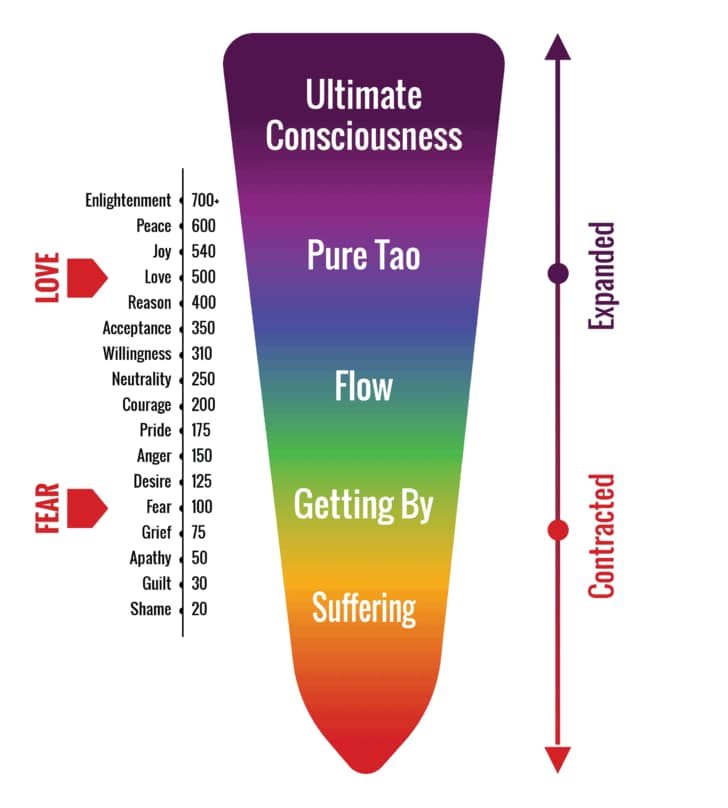
If you’re looking to reduce levels of anxiety and deal with stress levels to make yourself more tolerant or to lower stress then you are going in the right direction. Mindfulness practices are increasing in popularity in the United States as well as other industrialized nations. Some see it as a new way to deal with anxiety disorder, chronic pain, and a natural lowering of blood pressure. Other use a mindfulness program to improve their productivity in their business or work.
My personal experiences with implementing mindfulness have seen improvements and significant differences in the everyday life of millions of people all over the world.
It’s important to understand how our mind works to create anxiety and unwanted amount of excess stress. This is easy to see using the following image.

As you can see the lower energy feelings like guilt, apathy, and grief reside in the state of fear and a contracted consciousness. Ever wonder why groups of people riot? Many times it’s because they are stuck in the lower emotions of apathy and grief and seek a better feeling. That better state of expansion is a release of fear and turns into anger so they take to the streets in violence. This is a helpful chart to recognize your state of consciousness and allows you understand your feelings better.
Learn and use a mindfulness meditation
This may be one of the fastest ways to introduce mindfulness into your life. Although meditation is only part of what mindfulness is about, it’s a great strategy to include in your life at the present moment. Meshing a mindfulness meditation will definitely improve your quality of life and physical health along with improving upon mental health conditions. Your stress response will be improved also. That means that things that previously put your nerves on edge won’t effect you as much, or even at all after introducing meditation as a mindfulness intervention.
Use of statements of gratitude.
Another type of mindfulness training that will help you is statements of gratitude. I finally learned that gratitude is actually more powerful to the uplifting of your subconscious than positive affirmations. Both have their place, yet the gratitude statements offer appreciation and help establish a firmer focus on training your subconscious for positive results.
Overcome compassion fatigue
Compassion fatigue can be a big problem in our journey to applying mindfulness. Another big benefit of using gratitude statements is its ability to overcome compassion fatigue.
Most of us have experienced a kind of burnout from over caring and being overly conscientious to the point we begin to experience feelings of letting it all go. Some of the indications are: emotional exhaustion, reduced sense of personal accomplishment or meaning in work, mental exhaustion. decreased interactions with others (isolation), depersonalization (symptoms disconnected from real causes), and finally physical exhaustion. Using statements of gratitude can stop this type of fatigue.
Many people who have a substance abuse disorder experience a lack of compassionate response. Going too long without seeking a solution can create a major depressive disorder.
One of the top mindful solutions relating to this problem is meditation. I recommend you start light and simple, something like I have written about in this article. Once a person can slow the overactive mind frequencies down and begin a consistent meditation habit on a daily basis the substance use disorder can be rectified.
Use visualization to facilitate better mindfulness
A good example of applying the visualization concept is by sitting down and taking time to visualize in your mind the kind of person you would want to become from this day forward.
Think about the kind of personality you would want to have along with personal attributes you would want to be known for. You can even go a step further and visualize different scenarios where you are applying those attributes while interacting with people. Imagine they are reacting the way you would expect and them to.
Use positive thinking while doing this. It may seem you are being a fake at first but block those types of thoughts out. In reality it’s more likely people will react positively to you than negatively and this kind of visualization can help you better cope with stressful situations.
Plan your day ahead
Many success coaches encourage planning the night before. That doesn’t work for lots of people due to fatigue from the current day and when we get home and eat, visit with the family, and begin to slow down we feel too tired to experience our best self for the planning of tomorrow.
If that scenario seems familiar to you then make a habit of taking about ten minutes out of your morning routine to write down some tasks you want to get accomplished that day. You can do it using a pen and pad or use something like Google Calendar.
It’s important to get your intentions written down, or recorded into your calendar app, because that act will begin the creation process immediately. Most of us love to browse social media and the negative side of social media is how it scatters our brain.
We get into reactive mode and that makes it easy to lose perception of our vision for the day. Doing this daily planning technique is a great solution to mindfulness and works very well once you practice it over a long period of time.
Conclusion
Mindfulness in its simplest terms means to naturally allow your mind to have full attention on something. It involves the slowing down of mind chatter and really noticing what you’re doing. Being mindful is the opposite of rushing and multitasking while your mind moves extra fast. Numerous studies have proven that when you’re mindful your brain frequency is more relaxed toward the theta brain wave state. In theta you’re taking your time and relaxed and almost in a dreaming state. It takes a while to get to this condition and stay there. In theta state you’re focusing in a relaxed, easy way. Keep working on your mindfulness goals and read more articles on the site. You can do it and live in the honeymoon effect without the help of professional mental health services.
Recent Posts
Overthinking and ruminating can take a toll on one's mental health and well-being. Fortunately, mindfulness has been proven to be an effective tool for breaking free from these negative habits....
Psychology of Mindfulness: Unlocking the Power of Present Moment Awareness
Are you feeling overwhelmed by the fast-paced world we live in? Do you find yourself constantly worrying about the future or dwelling on the past? The practice of mindfulness may be just what you...
